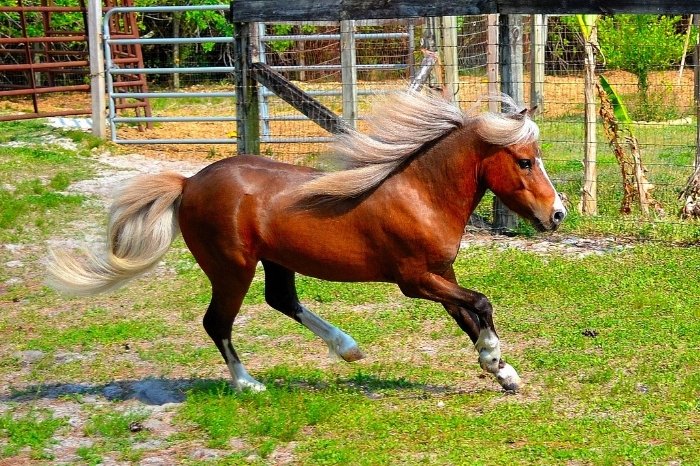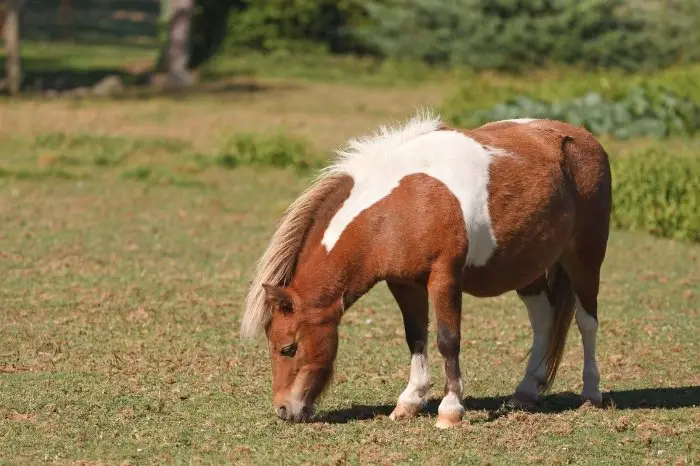Last Updated on April 7, 2023
We all know that owning a horse is a long-term commitment, and they can live for at least 20 years. But what about miniature horses – do they live as long as full-sized horses? Kust how long do mini horses live, and are they easy to look after? Let’s find out!
Many people are choosing to get a miniature horse as a great family pet or companion for a larger horse. But before giving a home to one of these tiny horses, you need to think about how long they can live.
Let’s find out all about miniature horses and discover how long their lifespan really is!
What is a Miniature Horse?
Firstly, let’s get something straight and figure out exactly what a miniature horse is. There are many different words to describe equine animals, and you will hear people refer to horses and ponies. But where do miniature horses fit into all this? Both miniature horses and ponies are much smaller than full-size horses. However, there are some significant differences between them.
Ponies are not only smaller than horses, but they have differences in their appearance and characteristics. They tend to be sturdier and have thicker body hair and are strong and athletic.
On the other hand, miniature horses have the same body shape and temperament as a horse, but just in a much smaller size! This means that they have a refined and elegant build, and are much more fragile than a pony.

So even though a miniature horse is as small or even smaller than a pony, it is still classified as a horse. These little horses are very popular as family pets, and can also be used for some equestrian activities.
Many breeds of miniature horses do not have the strength to carry a rider, but they may be able to pull a lightweight cart. They are also great for children to learn how to handle and care for a horse. Mini horses are becoming increasingly popular in the service animal sector, as they can support people with both mental and physical impairments.
These little horses are also very quick-witted, making them ideal for scurry driving and equine agility competitions. If you are a mini-horse owner, you will know how easily these little horses learn to solve problems, such as opening gates and escaping through tiny gaps!
Where do mini horses come from?
When it comes to miniature horse origin, the first record of purposely breeding smaller horses was in Europe in the 1600s. The upper classes and nobility liked to keep them as ornamental pets, but they were also useful as working animals in confined spaces such as mines.
In the 1800s the first mini horses arrived in the United States, where there are now two breed registries for these popular tiny equines.
How Long Do Mini Horses Live?
It is a peculiar feature of many animal species that, the smaller the breed, the longer their lifespan. For example, in dogs, the lifespan of a tiny Yorkshire Terrier is nearly twice as long as that of a giant Great Dane. But is the same true for horses?
Yes, it is! The lifespan of a miniature horse is surprisingly long, with many of these tiny equines living long and healthy lives of up to at least 30 years. It is not uncommon to find mini equines that are nearly 40 years old, and the oldest miniature horse lived to 50 years of age!
The Big Book of Miniature Horses
Is a Mini Horse Lifespan Longer Than a Normal Horse?
If you have a fit and healthy miniature horse, you can expect it to outlive a normal-sized horse by at least five years. The average lifespan of a medium-sized horse is 25 to 30 years.
However, as with any horse or pony, it must be kept free from health problems to live as long as possible. Mini horses need a carefully planned diet and should be kept as fit as possible. An overweight miniature horse that lazes around in a field all day will not live to a ripe old age!
What Factors Shorten a Miniature Pony Lifespan?
Although many mini horses live for a very long time, some factors can shorten their lifespan. This is because they are prone to several health issues:
-
Dwarfism
The intensive breeding of miniature horses to reduce their size has led to a rise in a condition called dwarfism. These are genetic mutations that lead to several health complications.
Luckily, many mini-horse breed societies now recognize this problem. They are taking steps to reduce the incidence of dwarfism by eliminating the use of horses with dwarfism genes for breeding.
-
Obesity
It is easy to overestimate the amount of food that these tiny horses need, and they can easily become obese. This will lead to life-threatening conditions such as laminitis and insulin resistance.

-
Limb deformities
It is not uncommon for a miniature horse to be born with a limb deformity, which may reduce its lifespan. These include angular limb deformities, where the limb is crooked or twisted. They are also prone to patella problems, such as patellar luxation.
-
Dental problems
Mini horses are more susceptible to dental issues due to their small size. This is because the teeth are too overcrowded, causing an overbite or underbite.
Dental problems can impair the horse’s ability to chew properly, leading to gastrointestinal problems. Overcrowded teeth can also cause issues such as sinusitis, a bacterial infection of the sinus.
-
Colic
Mini horses are one of the equines most prone to fecoliths. These are impactions of manure in the intestine, normally caused by poor chewing. Fecoliths often require surgical removal.
-
Hepatic lipidosis
If a mini horse stops eating, it will start to use its fatty tissue to provide energy and nutrition. This can be too much for the liver to process, and cause a disease called hepatic lipidosis, or ‘fatty liver disease’. If left untreated, hepatic lipidosis will quickly lead to liver failure and death.
-
Dystocia
Due to their incredibly small size, miniature horses can struggle to give birth naturally. It is also common for mini horse foals to have abnormally large heads in proportion to their body. This leads to dystocia, where the foal can become trapped in the birth canal.
How Long Do Dwarf Horses Live?
Sadly, many dwarf horses do not have a very long life expectancy. Dwarf horses are not the same as mini horses, although there is a high prevalence of dwarfism amongst mini horse breeds.
Dwarf horses occur when the offspring of two horses inherit a specific dwarfism gene, rather than miniature horses which are selectively bred to create smaller horses. Dwarfism genes do result in a smaller horse, but they can also cause many other issues.
There are two types of dwarfism in horses, and which type the horse has will affect the lifespan of the horse. The first type is called proportional dwarfism, where every part of the body reduces in size by the same amount. These types of dwarf horses tend to suffer from fewer health problems, although they can still suffer from issues common to mini horses such as dental overcrowding.
The other type of dwarfism is called disproportionate dwarfism and causes some parts of the body to be disproportionately smaller than others. This creates a horse that is physically out of proportion and can lead to severe physical disabilities and health problems. These types of dwarf horses tend to have a much shorter lifespan and are often euthanized as a result of their health issues.
How Big Do Mini Horses Get?
Because they are so small, mini horses are normally measured in centimeters or inches rather than hands. The acceptable height for a mini horse slightly varies according to which breed society the horse is registered with.
The American Miniature Horse Association will only include miniature horses measuring 34 inches or less on their breed registry. The American Miniature Horse Registry classes horses of this size as ‘A’ division mini horses and those that are between 34 and 38 inches are registered on the ‘B’ division register.
The average mini horse weight is 150 to 350 pounds. In contrast, some of the bigger horse breeds can weigh around 2,000 pounds – that’s more than 10 miniature horses! Their small size and weight mean that mini horses will cost far less to feed than full-size horses, but their other care costs can be just as expensive.
Summary
So, as we have learned, the lifespan of a miniature horse means it can live up to at least 30 years old. If they are fit and healthy, they will outlive larger horses by at least five years. However, many health problems can affect miniature horses which will shorten their lifespan.
We’d love to hear your thoughts about the lifespan of miniature horses. Have you ever heard of a miniature horse that lived to be more than 50 years old? Or maybe you want to learn more about miniature horse health problems? Please add a comment below and we’ll get back to you!

Kate Chalmers is a qualified veterinary nurse who has specialized in horse care for the vast majority of her career. She has been around horses since she was a child, starting out riding ponies and helping out at the local stables before going on to college to study Horse Care & Management. She has backed and trained many horses during her lifetime and competed in various equestrian sports at different levels.
After Kate qualified as a veterinary nurse, she provided nursing care to the patients of a large equine veterinary hospital for many years. She then went on to teach horse care and veterinary nursing at one of the top colleges in the country. This has led to an in-depth knowledge of the care needs of horses and their various medical ailments, as well as a life-long passion for educating horse owners on how to provide the best possible care for their four-legged friends.
Kate Chalmers BSc (Hons) CVN, Dip AVN (Equine) Dip HE CVN EVN VN A1 PGCE

